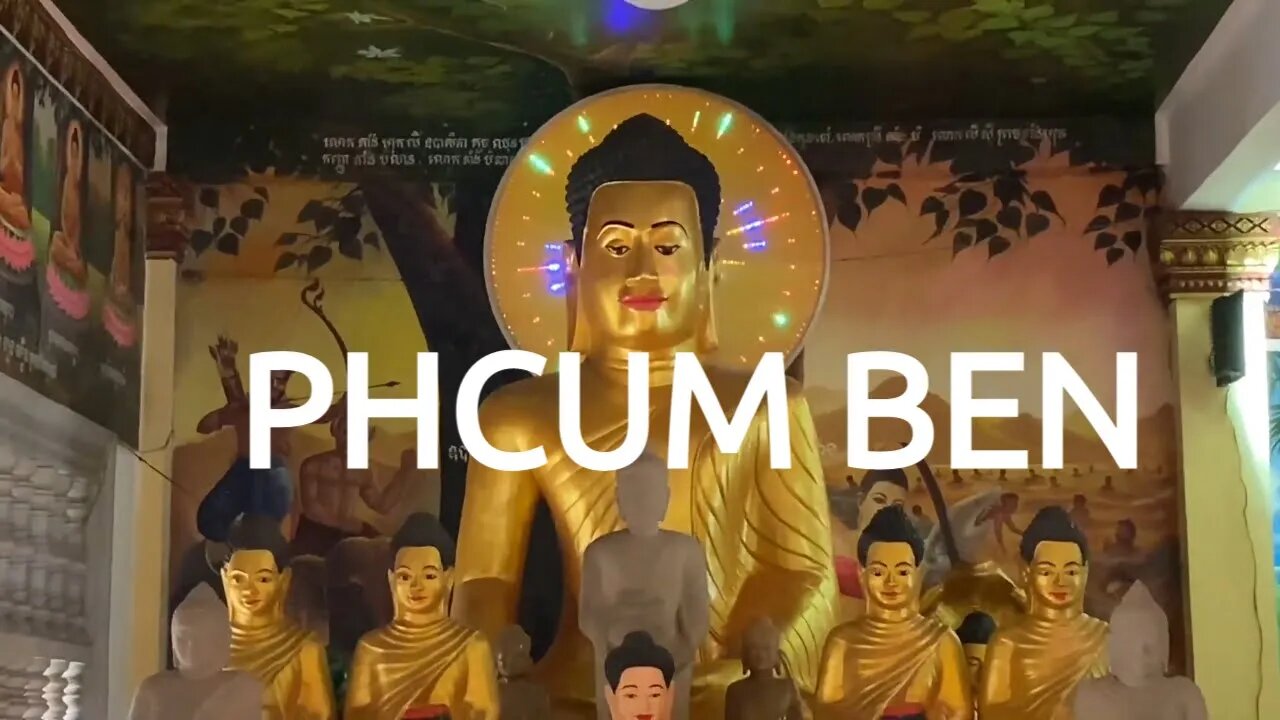Premium Only Content

An ancestor's day - Cambodians pay their respects to deceased relatives of up to 7 generations
Pchum Ben (Khmer: ភ្ជុំបិណ្ឌ, Phchŭm Bĕnd [pʰcom bən], lit. "Ancestor's Day") is a Cambodian 15-day religious festival, culminating in celebrations on the 15th day of the tenth month in the Khmer calendar, at the end of the Buddhist Lent, Vassa. In 2013, the national holiday fell on 03, 04, 5 October in the Gregorian calendar, the 2015 season began on 23 September and ends on 12 October. For 2022, Pchum Ben begins on September 11 and ends on September 25. (khmertimeskh.com, 15 Aug: Gov't announces dates for Pchum Ben, Kathen festivals.)
The day is a time when many Cambodians pay their respects to deceased relatives of up to 7 generations. Buddhist monks chant the suttas in Pali language overnight (continuously, without sleeping) in prelude to the gates of hell opening, an event that is presumed to occur once a year, and is linked to the cosmology of King Yama. During this period, the gates of hell are opened and spirits of the ancestors are presumed to be especially active. In order to liberate them, food-offerings are made to benefit them, some of them having the opportunity to end their period of purgation, whereas others are imagined to leave hell temporarily, to then return to endure more suffering; without much explanation, relatives who are not in hell (who are in heaven or other realms of existence) are also generally expected to benefit from the ceremonies.
In temples adhering to canonical protocol, the offering of food itself is made from the laypeople to the (living) Buddhist monks, thus generating "merit" that indirectly benefits the dead. However, in many temples, this is either accompanied by or superseded by food offerings that are imagined to directly transfer from the living to the dead, such as rice-balls thrown through the air, or rice thrown into an empty field. Anthropologist Satoru Kobayashi observed that these two models of merit-offering to the dead are in competition in rural Cambodia, with some temples preferring the greater canonicity of the former model, and others embracing the popular (if unorthodox) assumption that mortals can "feed" ghosts with physical food.
Pchum Ben is considered unique to Cambodia. However, there are merit-transference ceremonies that can be closely compared to it in Sri Lanka, such as offering food to the ghosts of the dead. In its broad outlines, it also resembles the Taiwanese Ghost Festival in its links to the notion of a calendrical opening of the gates of hell, King Yama, and so on.
-

JdaDelete
7 hours ago $1.26 earnedBanjo-Kazooie - wedNESday
28.9K3 -
 30:09
30:09
Iggy Azalea
9 hours ago $4.49 earnedplaying motherland
53.2K18 -
 LIVE
LIVE
SpartakusLIVE
6 hours agoDuos w/ Rallied || A Spartan and a Dragon ENTERTAIN the MASSES
480 watching -
 20:09
20:09
Exploring With Nug
14 hours ago $2.03 earnedVanished After Driving Away… I Spent the Day Searching Lakes
46.6K5 -
 1:14:13
1:14:13
Glenn Greenwald
6 hours agoLee Fang and Leighton Woodhouse Look Back on Trump’s First 100 Days; Lara Friedman on New Laws Barring Israel Criticism | SYSTEM UPDATE #446
103K58 -

ZWOGs
12 hours ago🔴LIVE IN 1440p! - DEATH STRANDING 1 - PLAYTHROUGH | DAY 4 | - Come Hang Out!
22.2K7 -
 1:45:28
1:45:28
Joker Effect
4 hours agoWhy aren't you trying to enjoy yourself? Live a little! go.mother.land/Joker
19.7K1 -
 2:06:37
2:06:37
Geeks + Gamers
4 hours agoMARIO KART WARS
15.3K -
 1:14:12
1:14:12
Right Side Broadcasting Network
5 days agoLIVE: Exclusive White House Special: President Trump's First 100 Days - 4/30/25
71.6K19 -
 1:02:30
1:02:30
BonginoReport
9 hours agoFBI Demotes Woke Agents Who Kneeled for George Floyd (Ep. 38) - Nightly Scroll with Hayley
122K127